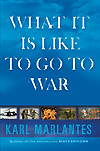
What It Is Like to Go to War, by Karl Marlantes, Atlantic Monthly Press, New York, 2011, $25
A Yale graduate and Rhodes Scholar, Karl Marlantes was also a Marine platoon leader in Vietnam, where he was awarded the Navy Cross, the Bronze Star, two Navy Commendation Medals for valor and two Purple Hearts. Now he has written a classic account of what happens in the heat of battle and what it is like to live for the rest of your life with what happens.
The Vietnam War was notable for its moral ambiguities and the anger and rebellion it generated back in the States, and Marlantes experienced it all. He performed heroically in combat, fought the North Vietnamese army’s best troops and won, and lied to his commanders when necessary to save his troops. Then he came home to find himself a pariah for having served—no friends came to welcome him, a woman on a train spat on him. And post-traumatic stress disorder, he discovered, can last for years.
Marlantes’ combat stories are the most compelling part of his book, but he is far too thoughtful to let it go at that. He wants to understand what happened to him, and the book is full of recommendations on how to successfully reintegrate combat veterans into civilian life and break the logjam of emotions that piles up when killing enemy soldiers and watching buddies die. He is sensitive enough to know the enemy was just as scared as he was, and just as human. Marlantes is savage on the subject of the body counts so important to the generals and explains how fictional they were: “The only truly meaningful statistic in warfare,” he writes, “is when the other side quits.”
But Marlantes is also a Marine, proud of his service, and this is not a cynical book. Warfare is in us, part of our human nature. The point is not to try to eliminate it, but to fight with honor and dignity. It will take a long time to repair the damage Vietnam did to us as a nation, but Marlantes has taken a step in that direction. He has told the truth, not least about himself. This is the book to read to understand combat and its costs.
—Anthony Brandt




